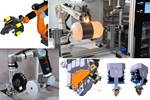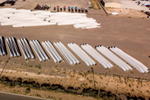GBM introduces new editorial roles covering automation and sustainability
CW parent company names Julia Hider correspondent for robots and autonomy and CW’s Hannah Mason correspondent for sustainability in manufacturing. Each role will cover a broader topic scope across industry.
Gardner Business Media (GBM, Cincinnati, Ohio, U.S.), parent company to CompositesWorld, is creating two new editorial roles to focus on emerging topics of broad importance across manufacturing — (1) robots and autonomy and (2) sustainability — which will be covered for all GBM brands.
Julia Hider, senior editor for the company’s Modern Machine Shop brand, will expand her role to become the company’s correspondent on robots and autonomy. Hannah Mason, technical editor for CW, will expand her role to become the company’s correspondent on sustainability in manufacturing.
“One of the most exciting topics to cover in my role at CW is the drive for sustainability solutions, and the technologies that enable them,” Mason says. She has been exploring themes of reuse and circularity in industrial production as part of her work for CW, and her new role expands on this, enabling her to report on priorities including energy efficiency, recycling and carbon footprint.
The composites industry has quickly become a hub in this pursuit, from the introduction and applications of bio-based materials and efforts to enhance the sustainability of fiber production, or even improving the energy efficiencies of machines and facilities (see CW’s sustainability microsite). While Mason will be covering the broader landscape for sustainability in manufacturing, composites still remain an important aspect to these developments — and the broader reach has implications for discovering new opportunities in areas of manufacturing that CW might miss.
Hider’s more general focus on robots and autonomy has a similar significance. Her new role will explore the ways ongoing advances in robot technology — including autonomous movement, collaborative-style robots, vision systems and interactions with AI — are changing the flow and infrastructure of automated manufacturing. These topics touch on many parts of the manufacturing world, and composites are no different, whether it’s to enhance production efficiencies and material capabilities, amongst other benefits.
“Our role as a media company serving manufacturing continues to evolve,” says Rick Kline, GBM president. “Across all our brands, which serve part producers in metal, plastics and composites, we have come to see that it is not enough to inform audiences just by reporting on the ideas and technologies most closely associated with them today. Particularly for manufacturers in higher value markets, the need they face is to produce more responsively — to use systems and technology to continue to reduce time and cost. To help them in this, we need to continue to bring them technology possibilities that are just ahead of where they are today.”
These two new editorial roles recognize that some the most notable developments affecting all the company’s audiences involve trends and technologies that do not land cleanly in a single brand’s coverage area. The new roles are likely to serve as a template for other, similar positions in the future covering other emerging technology areas.
Related Content
-
Plant tour: Daher Shap’in TechCenter and composites production plant, Saint-Aignan-de-Grandlieu, France
Co-located R&D and production advance OOA thermosets, thermoplastics, welding, recycling and digital technologies for faster processing and certification of lighter, more sustainable composites.
-
JEC World 2023 highlights: Recyclable resins, renewable energy solutions, award-winning automotive
CW technical editor Hannah Mason recaps some of the technology on display at JEC World, including natural, bio-based or recyclable materials solutions, innovative automotive and renewable energy components and more.
-
Plant tour: Arris Composites, Berkeley, Calif., U.S.
The creator of Additive Molding is leveraging automation and thermoplastics to provide high-volume, high-quality, sustainable composites manufacturing services.

















